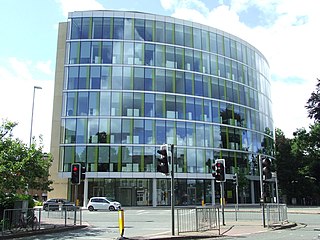This article needs additional citations for verification .(March 2022) |
An associate attorney is a lawyer and an employee of a law firm who does not hold an ownership interest as a partner.
This article needs additional citations for verification .(March 2022) |
An associate attorney is a lawyer and an employee of a law firm who does not hold an ownership interest as a partner.
An associate may be a junior or senior attorney, but normally does not hold an ownership interest in the firm even if associated with the firm for many years. First-year associates are entry-level junior attorneys and are generally recent law school graduates in their first year of law practice. [1] [2]
Generally, an associate has the goal of being made a partner in the firm, after a number of years gaining practice experience and being assigned to increasingly important and remunerative tasks. At firms with an "up or out" policy, associates who are repeatedly passed over for promotion to partner may be asked to resign. Some firms will also have "non-partner-track" associates who, though performing satisfactorily as employees, for whatever reason, will not be promoted to partner.
Junior attorneys were formerly called "law clerks"; the term "associate attorney" was coined by Emory Buckner, hiring partner of Root, Clark & Bird (which subsequently became Dewey Ballantine) in the 1920s.[ citation needed ] The term "law clerk" now generally refers to an attorney who serves as a research and writing assistant in a judge's chambers, although some law firms use the term to refer to a lawyer or non-lawyer who has specialized knowledge in one of the firm's practice areas but is not classified as a practicing attorney at the law firm.
Summer associates are current law students who have usually completed their second year of school (or in some cases, their first year of law school) and are interning at the firm for the summer. Summer associates have not passed the bar exam and are not attorneys. [1] The summer associate program is often the primary method by which a law firm recruits for full-time associate positions.
According to published data from the New York Times , the annual base salary for partner-track first year associate attorneys at top law firms in major U.S. legal markets such as New York, California, Massachusetts, the District of Columbia, and Texas can range from $160,000 to $190,000 per year—with salary varying depending on the size and reputation of the firm. [3]

A barrister is a type of lawyer in common law jurisdictions. Barristers mostly specialise in courtroom advocacy and litigation. Their tasks include taking cases in superior courts and tribunals, drafting legal pleadings, researching the law and giving expert legal opinions.

A lawyer is a person who practices law. The role of a lawyer varies greatly across different legal jurisdictions. A lawyer can be classified as an advocate, government lawyer, attorney, barrister, canon lawyer, civil law notary, counsel, counselor, solicitor, legal executive, or public servant — with each role having different functions and privileges. Working as a lawyer generally involves the practical application of abstract legal theories and knowledge to solve specific problems. Some lawyers also work primarily in advancing the interests of the law and legal profession.
An attorney at law in the United States is a practitioner in a court of law who is legally qualified to prosecute and defend actions in court on the retainer of clients. Alternative terms include counselor and lawyer. As of April 2011, there were 1,225,452 licensed attorneys in the United States. A 2012 survey conducted by LexisNexis Martindale-Hubbell determined 58 million consumers in the U.S. sought an attorney in the last year and that 76 percent of consumers used the Internet to search for an attorney.

Admission to the bar in the United States is the granting of permission by a particular court system to a lawyer to practice law in the jurisdiction and before those courts. Each U.S. state and similar jurisdiction has its own court system and sets its own rules for bar admission, which can lead to different admission standards among states. In most cases, a person is "admitted" or "called" to the bar of the highest court in the jurisdiction and is thereby authorized to practice law in the jurisdiction. Federal courts, although often overlapping in admission standards with states, set their own requirements for practice in each of those courts.
A paralegal, also known as a legal assistant, or paralegal specialist is a professional who performs tasks that require knowledge of legal concepts but not the full expertise of a lawyer with a license to practice law. The market for paralegals is broad, including consultancies, companies that have legal departments or that perform legislative and regulatory compliance activities in areas such as environment, labor, intellectual property, zoning, and tax. Legal offices and public bodies also have many paralegals in support activities using other titles outside of the standard titles used in the profession. There is a diverse array of work experiences attainable within the paralegal field, ranging between internship, entry-level, associate, junior, mid-senior, and senior level positions.
O'Melveny & Myers LLP is an American multinational law firm founded in Los Angeles, California in 1885. The firm employs approximately 740 lawyers and has offices in California, Washington, D.C., New York City, Beijing, Brussels, Hong Kong, London, Seoul, Shanghai, Singapore, and Tokyo.
A counsel or a counsellor at law is a person who gives advice and deals with various issues, particularly in legal matters. It is a title often used interchangeably with the title of lawyer.
A bar examination is an examination administered by the bar association of a jurisdiction that a lawyer must pass in order to be admitted to the bar of that jurisdiction.

A law firm is a business entity formed by one or more lawyers to engage in the practice of law. The primary service rendered by a law firm is to advise clients about their legal rights and responsibilities, and to represent clients in civil or criminal cases, business transactions, and other matters in which legal advice and other assistance are sought.

Simpson Thacher & Bartlett LLP is a white-shoe law firm headquartered in New York City. The firm specializes in litigation and corporate practices, particularly mergers and acquisitions and private equity, with over 1,000 attorneys in 11 offices worldwide.

A law clerk, judicial clerk, or judicial assistant is a person, often a lawyer, that provides direct counsel and assistance to a lawyer or judge by researching issues and drafting legal opinions for cases before the court. Judicial clerks often play significant roles in the formation of case law through their influence upon judges' decisions. Judicial clerks should not be confused with legal clerks/paralegals, court clerks, or courtroom deputies who perform administrative duties within the legal profession and perform more quasi-secretarial duties than law clerks, or legal secretaries that only provide secretarial and administrative support duties to attorneys and/or judges.
Attorney's fee is a chiefly United States term for compensation for legal services performed by an attorney for a client, in or out of court. It may be an hourly, flat-rate or contingent fee. Recent studies suggest that when lawyers charge a flat-fee rather than billing by the hour, they work less hard on behalf of clients and clients get worse outcomes. Attorney fees are separate from fines, compensatory and punitive damages, and from court costs in a legal case. Under the "American rule", attorney fees are usually not paid by the losing party to the winning party in a case, except pursuant to specific statutory or contractual rights.

Legal education in the United States generally refers to a graduate degree, the completion of which makes a graduate eligible to sit for an examination for a license to practice as a Lawyer. Around 60 percent of those who complete a law degree typically practice law, with the remainder primarily working in business or government or policy roles, where their degrees also confer advantages.

Articled clerk is a title used in Commonwealth countries for one who is studying to be an accountant or a lawyer. In doing so, they are put under the supervision of someone already in the profession, now usually for two years, but previously three to five years was common. This can be compared as being an intern for a company. Trainees are obligated to sign a contract agreeing to the terms of being an articled clerk. The articled clerk signs a contract, known as "articles of clerkship", committing to a fixed period of employment. Wharton's Law Lexicon defines an articled clerk as "a pupil of a solicitor, who undertakes, by articles of clerkship, continuing covenants, mutually binding, to instruct him in the principles and practice of the profession". The contract is with a specific partner in the firm and not with the firm as a whole.
Of counsel is the title of an attorney in the legal profession of the United States who often has a relationship with a law firm or an organization but is neither an associate nor partner. Some firms use titles such as "counsel", "special counsel", and "senior counsel" for the same concept. According to American Bar Association Formal Opinion 90-357, the term "of counsel" is used to describe a "close, personal, continuous, and regular relationship" between the firm and counsel lawyer. In large law firms, the title generally denotes a lawyer with the experience of a partner, but who does not carry the same workload or business development responsibility.
Sidley Austin LLP is an American multinational law firm with approximately 2,000 lawyers in 20 offices worldwide. It is one of the largest law firms in the world by revenue and by profit per partner. The firm's headquarters is at One South Dearborn in Chicago's Loop. The firm specializes in a variety of areas in both litigation and corporate practices. It is widely considered to be one of the most recognizable and prestigious law firms in the United States. Among its notable alumni are Former President Barack Obama and Former First Lady Michelle Obama.
An admission to practice law is acquired when a lawyer receives a license to practice law. In jurisdictions with two types of lawyer, as with barristers and solicitors, barristers must gain admission to the bar whereas for solicitors there are distinct practising certificates.
A contract attorney is a lawyer who works on legal cases on a contract basis. Such work is generally of a temporary nature, often with no guaranteed employment term.

Emory Roy Buckner was a prominent U.S. lawyer who served as the United States Attorney for the Southern District of New York, where he gained a reputation as one of the greatest prosecutors in American history. During his time at Root, Clark & Bird, he was also one of the architects of modern Wall Street's legal culture.
The Cravath System is a set of business management principles first developed at Cravath, Swaine & Moore in the early 20th century. John Oller, author of White Shoe, credits Paul Drennan Cravath with creating the model in the early 20th century which was adopted by virtually all white-shoe law firms, 50 years before the phrase white shoe came into popular use. The Cravath System has been adopted by many leading law firms, consulting agencies, and investment banks in the United States.